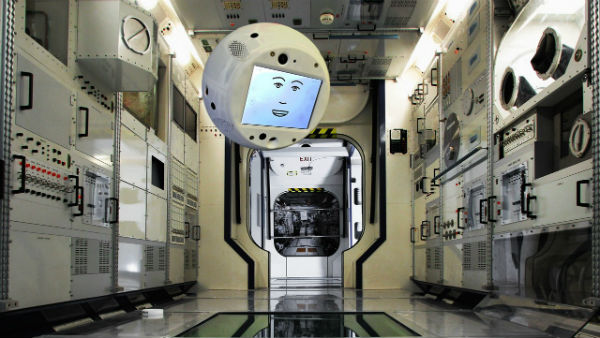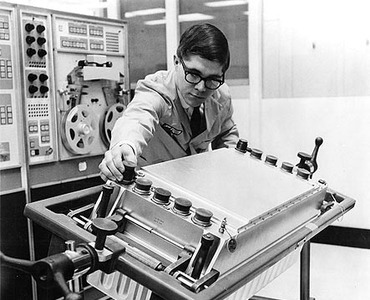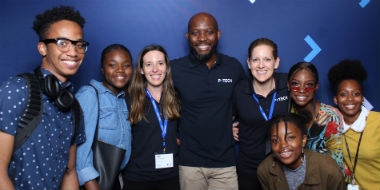Space Exploration
On International Space Day, Students Create Virtual Assistants with AI
May 3, 2019 | Written by: James Daly
Categorized: P-TECH | Space Exploration
Share this post:

IBM Watson-based CIMON. (Photo courtesy of Airbus.)
To celebrate International Space Day, IBM hosted 35 students from the Brooklyn-based Pathways in Technology Early College High School program, who got an inside look, and first-hand experience, in how to leverage artificial intelligence for the advancement of space exploration.
The P-TECH students learned about CIMON (short for Crew Interactive MObile CompanioN), which was developed by Airbus on behalf of the German Aerospace Center (DLR) and uses IBM Watson artificial intelligence capabilities. CIMON is a basketball-shaped, AI-based assistant for astronauts that is currently aboard the International Space Station.
The students heard from Betsy Schaefer, Director of Watson Marketing IBM Data and AI, and Sophie Richter-Mendau, a CIMON researcher and psychologist with IBM, before applying their own skills in a space-themed Watson Assistant workshop.
International Space Day, observed annually on the first Friday in May, is a chance to promote math, science, technology and engineering education in young people to inspire them to pursue a career in space-related jobs. Homer Ahr, lead architect and technical engineer at IBM from Apollo through Space Shuttle missions, sees it as an important way to inspire the next generation of scientists and engineers who are eager to explore the mysteries of space.

IBM’s Saturn guidance computer in 1965 issued signals 25 times a second to keep Saturn on course during launch.
“Kids need both a sense of purpose and inspiration, and the exploration of space provides that,” says Ahr, who worked at IBM for 17 years. “The more we can show kids the joy and excitement of space, as well as the character-building multidisciplinary benefits of working as a team toward an important goal, the better off we’ll be.”
Past and Future
IBM has a long history of working to develop the tools for space flight, going back to the 1940s. That includes the Mercury and Gemini programs, when IBM built the space guidance computer, through the Apollo program, where the company provided everything from ground control software to on-board equipment and machinery.
IBM processors have supported missions including the Mars Pathfinder, which established a base station on the red planet. Further Mars exploration continued with the Curiosity and Insight rovers, launched in 2011 and 2018, respectively. The RAD750 computer, based on IBM’s PowerPC 750, powered both rovers.
Looking ahead, IBM technology will enable the Mars 2020 rover mission by NASA’s Mars Exploration Program. It has a planned launch of July 2020 with touch down at the planet’s Jezero crater in February 2021. The mission will seek signs of habitable conditions on Mars in the ancient past and will also search for biosignatures of past microbial life.
With luck, some of the students touring IBM today may be part of those or other future NASA missions. Adds Ahr: “Exploring space is as big a motivator as you’re ever going to have.”
Related: THINK Blog: Watson Hops On Board Human Space Flight
__________________________________
James Daly is a business and tech journalist in Northern California who has worked for Wired, TED, Forbes, Business 2.0, Edutopia, Google, and Red Herring, among others.

Business & Technology Journalist
Using Tech for Good Where it Matters Most in Fast Company’s World Changing Ideas
Making the world a better place is a guiding principle embedded in IBM’s core values. As COVID-19 continues to present unprecedented, global challenges for individuals, communities and organizations across the globe, we continue to take a stand and do what’s right to reestablish health and safety across the globe. I’m constantly in awe with the […]
Pandemic Impacts Millions of Students; How Digital Learning Can Help
The global scale and speed of disruption in education from the COVID-19 pandemic is “unparalleled” according to the United Nations with an estimated 290 million students impacted globally and growing. And several schools and universities have chosen to forgo in-person classes in favor of remote learning. The closing of classroom doors couldn’t come at a […]
P-TECH Aims to Make Irish Workforce More Diverse, Equitable, and Inclusive
As a P-TECH industry partner working at Irish Life & Canada Life in Dublin’s north east inner city, we’re working to integrate innovative and emerging technologies in our business –with support from local community talent to make our workforce more diverse, equitable, and inclusive. All industries across all sectors are digitizing and the jobs market […]


